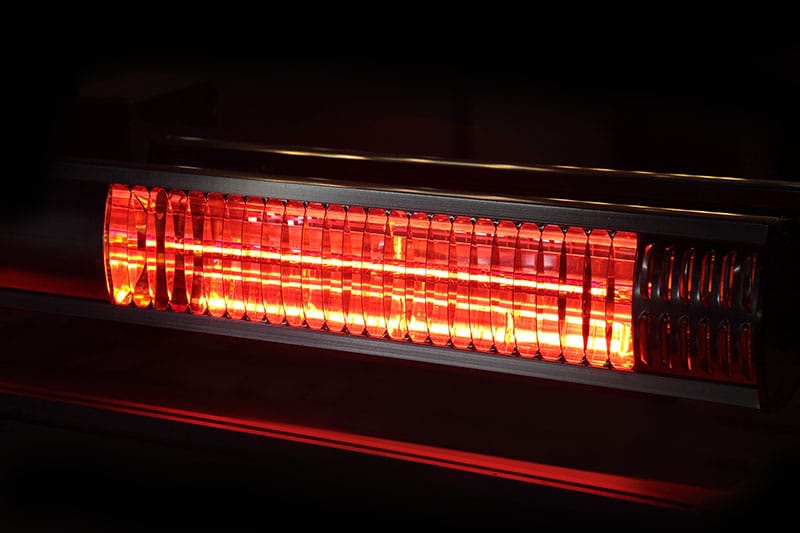Boston winters are long, bitter, and very cold, leading homeowners to use supplemental but affordable heat sources like space heaters. Many people assume that using space heaters to warm their home is a good idea, but these devices come with a long list of potential hazards. Here’s what to know about the dangers of space heaters, what you can do to keep your family safe, and who to call for experienced heating service and repairs.

Top Winter Space Heater Safety Issues
There are two primary ways that space heaters pose safety risks to people: home fires and carbon monoxide poisoning. You should be well informed about these issues and what you can do to keep yourself and your family safe and comfortable at home.
Home Fires
Space heaters are responsible for an overwhelming number of house fires every year. In fact, according to the National Fire Protection Association (NFPA), 44% of all home fires in the U.S. can be attributed to the use of these devices.
How do space heaters cause home fires?
There are multiple ways a space heater can cause a home fire, such as:
- Circuit overload. Space heaters use a lot of power, which can be grueling on the electrical circuits of Massachusetts’ older homes. If the heater overloads the circuit or blows a fuse, this may cause an electrical fire.
- Ignited objects. Objects that are too close to the space heater may ignite. Space heaters should never be placed near furniture, drapes, clothing, or other flammable objects.
- Although most space heaters today have safety features that automatically shut off the heater if it isn’t stable or if it’s fallen over, but these may not work properly. If a space heater gets knocked down or tips over, especially at night, this could result in a fire.
Carbon Monoxide Poisoning
Carbon monoxide is a natural but deadly gas that is both odorless and colorless, making it extremely difficult to detect. CO is formed by burning wood, gases like butane or propane, and charcoal, and without proper ventilation, this gas can build up a small space. Carbon monoxide may be produced by space heaters, gas or wood burning stoves, propane and butane torches, and similar.
How do space heaters cause carbon monoxide poisoning?
When it enters the body, carbon monoxide reduces the amount of oxygen in the bloodstream, thereby denying oxygen to the critical organs like the liver, kidneys, heart, and brain. CO gas may cause a person to lose consciousness before they even realize something is wrong, and chronic exposure to CO gas can cause headaches, dizziness, nausea, vomiting, loss of vision or hearing, brain damage, and death.
Safety Tips for Space Heaters
If you are going to use a space heater in your home this winter, be sure to take the following safety precautions:
- Do not put anything in front of your space heater. Make sure there are no towels, blankets, drapes, furniture, carpet, or other easily flammable objects near your heater.
- Set your heater on a stable surface. The heater should not be perching on the edge of a counter or on any surface that does not fully cover the bottom of the space heater. You should ensure that the surface used cannot move and that no pets or children can access it.
- Opt for portable electric oil or hot water heaters if needed. If you do need to use a space heater, opt for the kind that use electricity to heat up water or oil inside a radiator that then slowly disperses heat throughout your space. These may not provide heat instantly but they are much less of a fire hazard than heaters that use electricity to heat up metal coils and blow warm air out.
- Choose models with extra safety features. Any space heater you select should have a programmable thermostat, automatic and timed shut-off, and tip-over protection.
- Do not use fuel-burning heaters indoors. Space heaters that use a fuel source like kerosene or propane should not be used indoors or other poorly ventilated areas.
- Don’t leave a space heater on overnight. Although manufacturers of modern space heaters claim that newer models are safe to leave on overnight, this is something you should never do. A staggering 85% of house fire deaths that occur as a result of heater use happen at night between the hours of 12:00 AM and 8:00 AM. The NFPA reports that this is when the fewest fires but highest number of deaths occur. That means leaving your space heater on at night puts you and your family at a higher risk of death if a fire should occur.
Central and Ductless Heating Alternatives
Central and ductless heating options are much safer and cost-effective heating alternatives than space heaters, especially in very cold areas like New England. Ductless heating is ideal when you want to add more heat to a home or office with an existing HVAC system.
For example, if you have central heat and air but tend to get cold spots in your home due to drafty old windows, adding a single ductless unit can solve this problem. Working together, neither the central heating system or the ductless unit is doing an excess amount of work in very cold weather. This is a great option for Boston home and business owners.
Contact N.E.T.R., Inc. Today for Reliable Heating Services
Contact veteran Boston HVAC contractor N.E.T.R., Inc. today to learn more about how space heaters can pose a risk to your family or to get help with central or ductless heating in your home or business. Call now to speak with our Mitsubishi Electric Diamond Elite contractors today by dialing (781) 933-6387.

